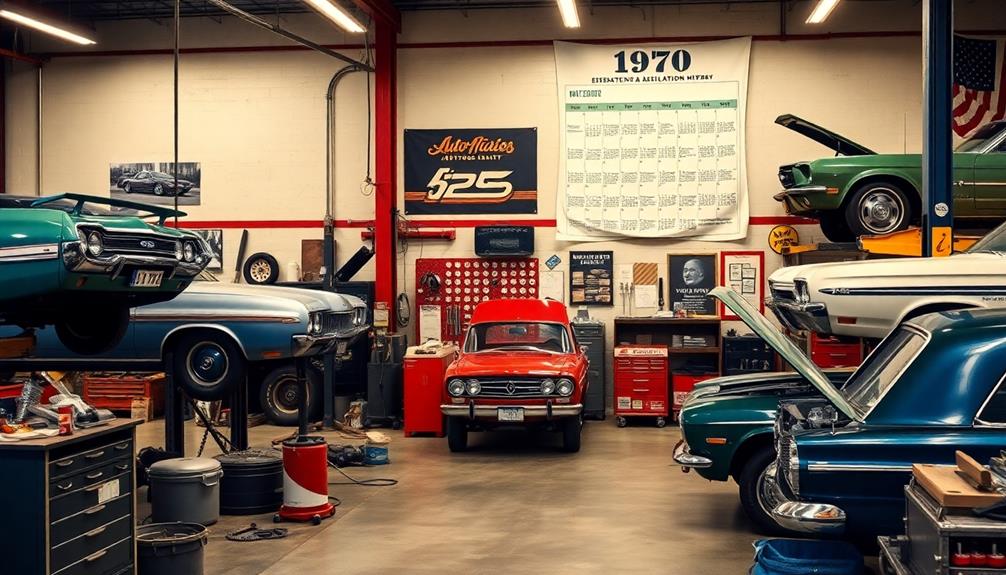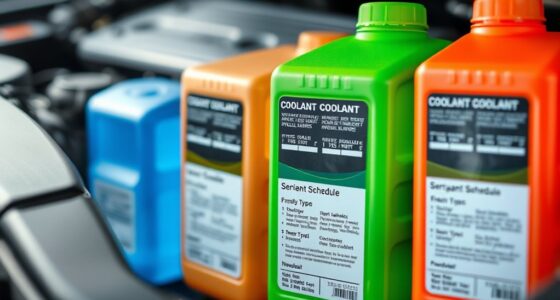Your air filter might be hiding harmful pollutants and allergens that can seriously impact your health. If you neglect to replace it regularly, you could trigger allergies, respiratory issues, and even costly HVAC breakdowns. A dirty filter strains your system, increasing energy bills and reducing airflow. Look for signs like visible dirt buildup, color changes, or rising energy costs—they all point to a filter that needs changing ASAP. Don't let hidden dangers linger in your home; timely replacements can enhance air quality and system efficiency. You'll want to know how to keep your air clean and your system running smoothly.
Key Takeaways
- Dirty air filters trap harmful pollutants, reducing indoor air quality and potentially triggering allergies or respiratory issues.
- Neglecting filter replacement strains HVAC systems, increasing energy bills and the risk of costly breakdowns.
- Signs of a clogged filter include visible dirt buildup, reduced airflow, and rising energy costs.
- Regularly replacing filters every 1-3 months enhances HVAC efficiency and indoor air quality.
- High-efficiency filters capture smaller particles, significantly improving air quality and reducing health risks.
Importance of Air Filters
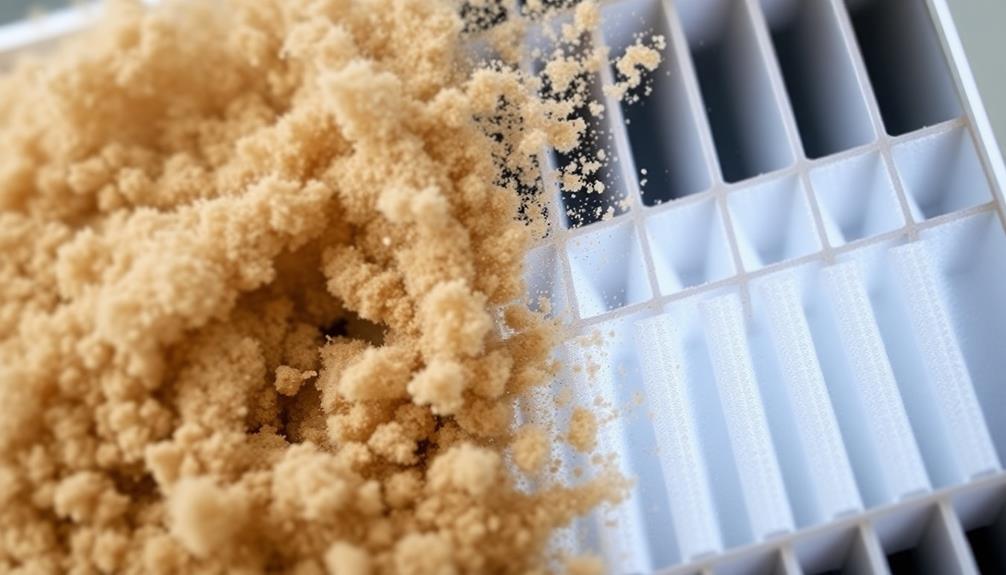
Understanding the importance of air filters is essential for maintaining a healthy indoor environment. They trap pollutants like dust, pollen, and pet dander, which can aggravate allergies and respiratory issues. By ensuring your air filters are clean, you greatly improve your air quality, creating a more comfortable living space.
Additionally, maintaining clean air filters is vital for the efficiency of your HVAC system, as heat pumps can greatly reduce energy costs when operating efficiently.
Neglecting to replace a dirty air filter can lead to a considerable drop in air quality. Clogged filters force your HVAC system to work harder, which not only raises your energy bills by 5-15% but also shortens the lifespan of your system. Regularly changing your air filters every 1-3 months helps prevent these issues.
When you replace air filters on schedule, you boost overall system efficiency, allowing your HVAC system to operate smoothly. This not only enhances indoor air quality but also contributes to a more environmentally friendly home.
Risks of Neglecting Replacement
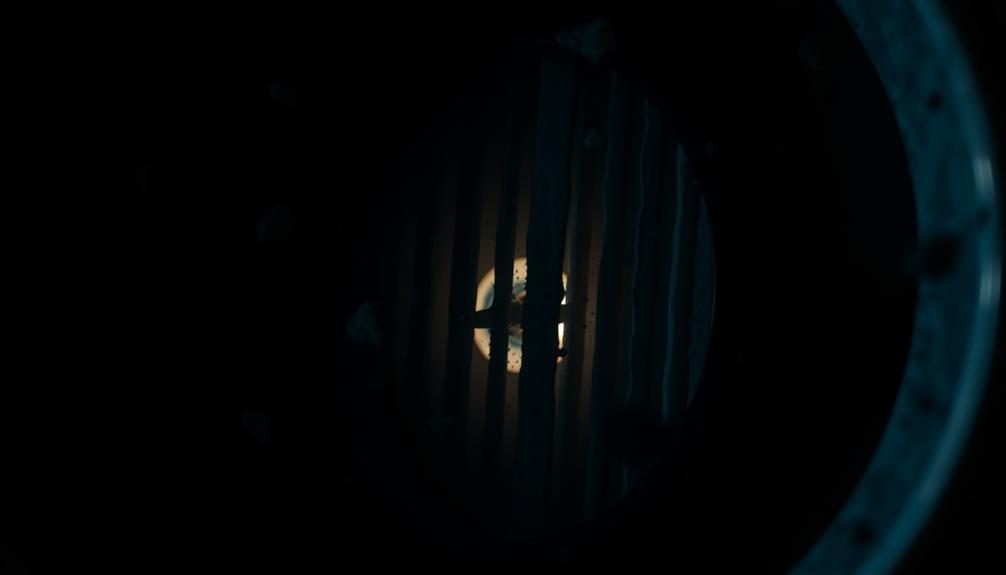
Neglecting air filter replacement can lead to serious health and financial consequences. When you fail to replace your air filter, indoor air quality markedly declines. This can trigger allergies and respiratory issues as pollutants like dust and pollen accumulate.
Regular cleaning and monitoring of your air purifier can help mitigate these risks and maintain better air quality regular cleaning is vital. Not only does this affect your health, but it also burdens your HVAC system. Clogged filters force your system to work harder, increasing energy bills by 5-15% according to the Department of Energy.
Moreover, dirty filters can cause overheating, leading to dangerous malfunctions and even fire hazards due to restricted airflow. If you continue neglecting to replace your air filter, you risk frozen coils in your heat pump, which can result in costly breakdowns and potential compressor damage.
Regularly replacing your air filter is essential to prevent these risks and guarantee your HVAC system runs efficiently. Neglecting this simple maintenance leads to increased wear and tear on your components, greatly raising the likelihood of expensive repairs.
To safeguard your health and finances, make it a priority to replace your air filter regularly. Don't wait until it's too late!
Signs You Need a New Filter
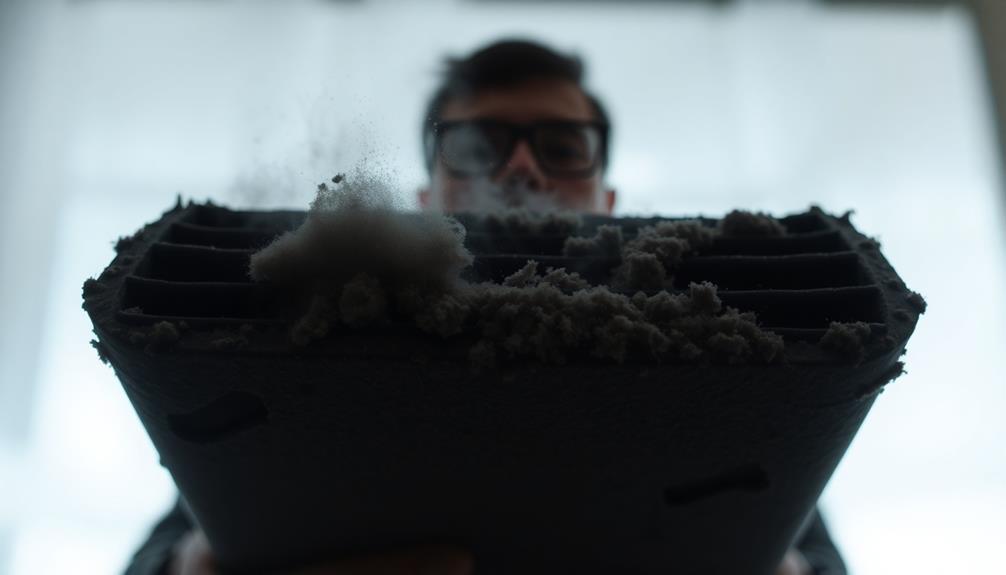
Many signs indicate it's time to replace your air filter. Ignoring these signs can lead to poor air quality and strain your HVAC system.
A dirty filter can also compromise the effectiveness of your air purifier, which is essential for achieving ideal health benefits in your home.
Here are four key indicators that it's time for a change:
- Visible Dirt Buildup: If you see dirt and lint on your air filter, it's a clear sign it needs replacing to maintain clean air.
- Color Change: A filter that has markedly changed color from its original state is likely clogged and should be replaced immediately.
- Reduced Airflow: Noticeable decreases in airflow or heating efficiency can signal a dirty filter. If your home feels less comfortable, it's time to replace the filter.
- Rising Energy Bills: An increase in energy costs may indicate your HVAC system is working harder due to a clogged filter. Replacing it can help improve efficiency and lower bills.
If you or your family members experience worsening allergies or respiratory issues, it could also be due to a dirty filter.
Don't wait—replace your air filter to maintain a healthy and efficient home environment.
Steps for Filter Replacement
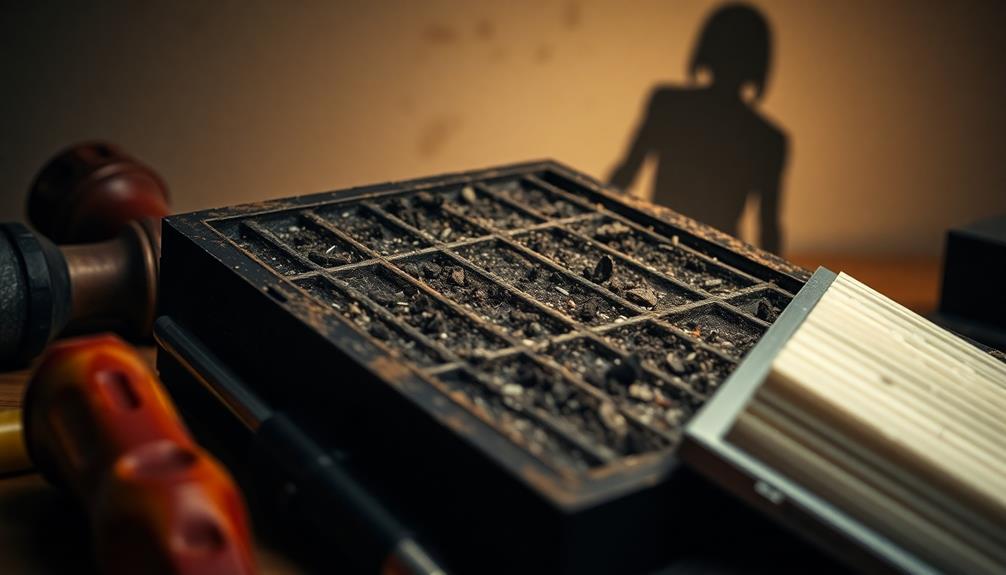
To replace your air filter, start by identifying its location in your HVAC system.
Once you know where it is, make certain to purchase the correct size for a proper fit.
With the right filter on hand, you can follow the installation steps to guarantee ideal air quality.
Identify Filter Location
Have you ever wondered where to find your air filter? Identifying its location is essential for changing the air filter in your HVAC systems. Here are some steps to help you locate it:
- Check Return Air Vents: Your air filter is often found behind return air vents in your home. Look for grilles or covers that can be removed.
- Inspect the HVAC Unit: If you don't find it at the vents, look inside the HVAC unit itself. The air filter is usually accessible through an access panel.
- Unfasten Clips or Brackets: Once you've located the filter, carefully unfasten any clips or brackets holding it in place. Be gentle to avoid damaging any surrounding components.
- Remove and Inspect: Slide the filter out and inspect it for dirt and debris. A significant buildup means it's time for a replacement.
Remember to refer to your HVAC system's manual for specific instructions and recommendations. Knowing where to find your air filter can make the process of changing the air filter much easier and help maintain your system's efficiency.
Purchase Correct Size
Finding the right air filter size is crucial for maintaining your HVAC system's efficiency. Start by locating the filter in your unit and check for the dimensions printed on its side. If you can't find the size, refer to your HVAC manual for the specific requirements.
When you're ready to purchase the correct size air filter, make certain it matches the dimensions and efficiency ratings you found. Higher-rated filters trap more pollutants, improving your indoor air quality.
To help you keep track, here's a simple table for your reference:
| Filter Size (inches) | Efficiency Rating |
|---|---|
| 16 x 20 | MERV 8 |
| 20 x 25 | MERV 11 |
| 24 x 30 | MERV 13 |
Always note the direction of airflow indicated by arrows on the filter when you replace it. Incorrect installation can hinder your HVAC system's performance. Finally, maintain a record of your filter size and replacement dates to simplify future purchases and guarantee peak efficiency.
Proper Installation Steps
Replacing your air filter is a straightforward task that can greatly improve your HVAC system's efficiency.
By following these proper installation steps, you can guarantee a smooth filter replacement process:
- Turn Off the HVAC System: Always start by turning off your HVAC system to guarantee safety and prevent any damage during the replacement.
- Remove the Old Filter: Carefully take out the old filter, paying attention to its orientation. Proper airflow direction is essential for efficient operation.
- Check Filter Size: Verify the size of your new filter by referencing the numbers printed on the old filter or consulting your HVAC manual for specific requirements.
- Install the New Filter: Fit the new filter into place, aligning it according to the directional arrows that indicate airflow. Confirm it fits snugly to prevent any leaks.
Once you've completed these steps, restart your HVAC system.
You'll immediately notice an improvement in indoor air quality and overall system performance.
Replacing the air filter regularly helps keep your home healthy and comfortable!
Maintenance Tips for Longevity
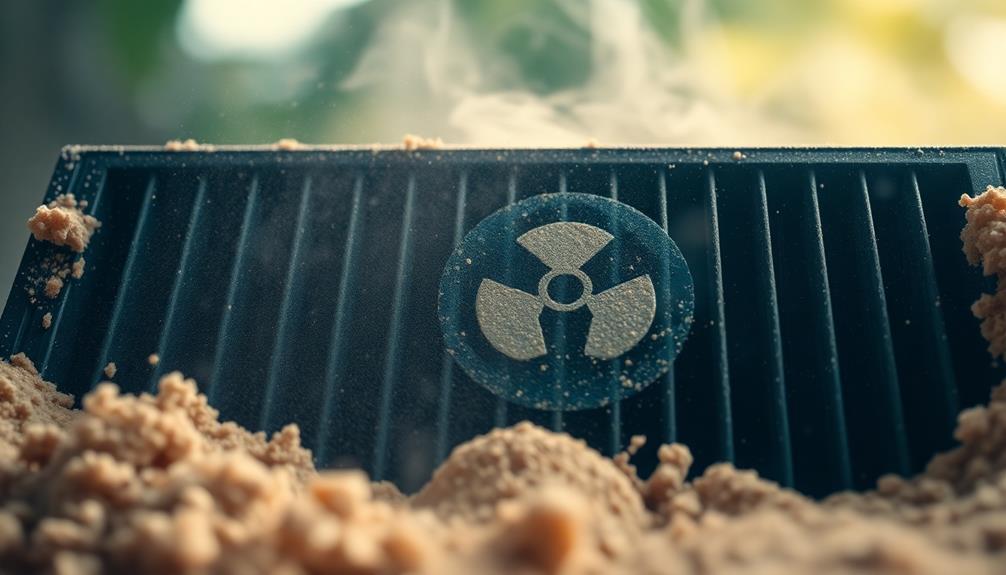
To keep your air filters working efficiently, schedule regular inspections every 1-3 months.
Choosing high-efficiency filters can really boost your indoor air quality, so consider making that upgrade.
Don't forget to track replacement dates to avoid clogs and guarantee your system runs smoothly.
Regular Inspection Schedule
Establishing a regular inspection schedule for your air filters is essential for maintaining ideal HVAC performance and ensuring good indoor air quality.
Ideally, you should check your air filters every 1-3 months. If you live in a new construction or have pets, you might need to inspect them more frequently due to increased dust and hair accumulation.
Here are some tips to help you stay on track with maintenance:
- Set Reminders: Use your phone or calendar to remind you of inspection dates.
- Track Replacement Dates: Document when you replace your air filter to maintain consistency and avoid clogged filters.
- Inspect Conditions: Regularly check the condition of your filters; look for dirt, dust, or damage.
- Document Results: Keep a record of your inspections to identify patterns and potential HVAC issues early on.
Choose High-Efficiency Filters
Choosing high-efficiency filters can greatly enhance your HVAC system's performance, especially after you've set up a regular inspection schedule.
These filters are designed to trap smaller particles, including allergens and bacteria, which considerably improves your indoor air quality compared to standard filters. By investing in high-efficiency filters, you're not only creating a healthier living environment but also reducing the risk of allergies and respiratory issues for everyone in your home.
Additionally, using these filters can lower your energy costs by 5-15%. They maintain peak airflow in your HVAC system, helping it run more efficiently. This efficiency also prolongs the lifespan of your system by decreasing wear and tear caused by dirty filters.
To reap the full benefits, remember to replace your high-efficiency filters every 1-3 months. Regular routine maintenance is essential to prevent clogging and guarantee consistent airflow.
Track Replacement Dates
Keeping track of air filter replacement dates is essential for maintaining ideal indoor air quality and HVAC efficiency. Filters should be checked and replaced every 1-3 months to prevent clogged filters that can lead to increased allergens and reduced airflow.
Here are some practical tips to help you track and replace your filters effectively:
- Set Calendar Reminders: Use your phone or digital calendar to set reminders for regular filter changes.
- Document Replacement Dates: Keep a log of when you replace filters to identify patterns and adjust your schedule accordingly.
- Label the Compartment: Write the replacement date on the filter compartment for a quick visual cue.
- Monitor Usage: If you notice your filters clogging faster due to heavy use or environmental factors, adjust your replacement frequency.
Professional Help and Resources
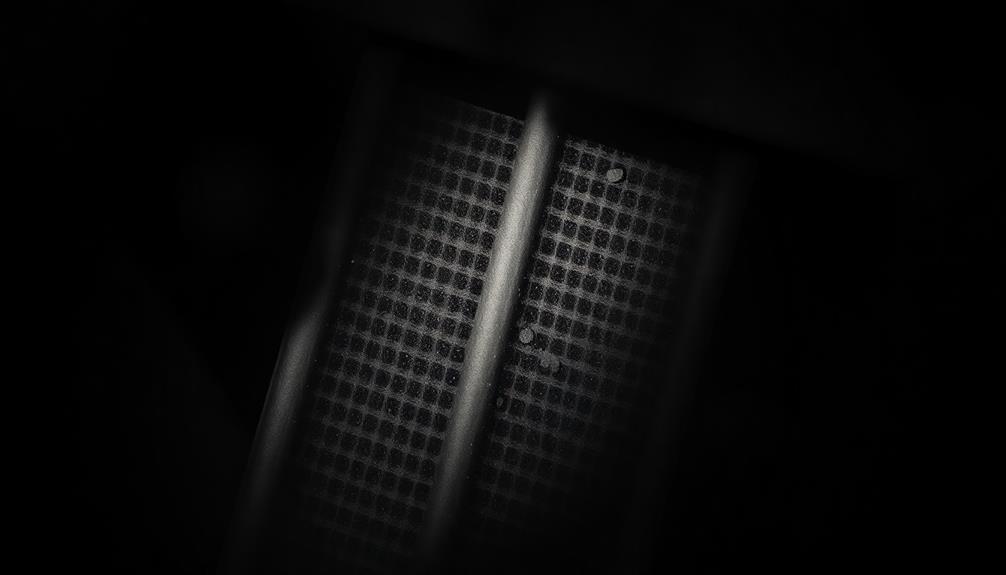
When it comes to maintaining your HVAC system, seeking professional help can make a significant difference in both efficiency and air quality. A qualified HVAC technician can provide thorough inspections and maintenance, ensuring that your air filter gets replaced correctly and on time. This proactive approach maximizes your system's efficiency and can prevent costly repairs in the future.
Many HVAC companies offer subscription plans that include regular filter changes and professional check-ups. These plans not only save you money but also relieve you of the hassle of remembering when to replace your air filter.
If you're unsure about the correct filter type or size for your system, don't hesitate to consult your HVAC manual or contact a professional for guidance. Making the wrong choice could negatively affect your system’s efficiency or even cause long-term damage. Additionally, regular maintenance and timely filter replacement are crucial for optimal performance. Just like addressing common issues such as why your car won’t start, it’s important to ensure your HVAC system is operating with the proper components to avoid unnecessary problems.
Additionally, online resources and community forums can be invaluable. They allow you to share experiences and gather recommendations on HVAC maintenance and filter types from fellow homeowners.
Engaging with local HVAC experts can provide tailored advice and service options, ensuring your system operates safely and effectively while maintaining ideal indoor air quality.
Prioritizing professional help will keep your home comfortable and healthy for years to come.
Frequently Asked Questions
What Happens if I Don't Replace the Air Filter?
If you don't replace the air filter, your indoor air quality suffers, allergens circulate, and your HVAC system works harder. This can lead to higher energy bills, overheating, and costly repairs. Regular maintenance is essential.
How Much Does It Cost to Replace the Air Filter in a Car?
Replacing your car's air filter is like giving your engine a rejuvenating boost. Typically, it costs between $15 and $70, depending on your vehicle. DIY replacement can save you money and time.
How to Tell if an Engine Air Filter Needs to Be Replaced?
To tell if your engine air filter needs replacing, visually inspect it for dirt or debris. Watch for signs like engine misfires, rough idling, or decreased acceleration. Regular checks every 12,000 to 15,000 miles help too.
What Happens if You Haven't Changed Your Air Filter in 2 Years?
Imagine breathing in a dust storm; that's what happens if you haven't changed your air filter in two years. Your home's air quality plummets, and your HVAC system struggles, leading to costly repairs. Don't wait!
Conclusion
Don't wait until it's too late—your air filter could be hiding dangers you can't see. Ignoring those subtle signs might lead to health risks you never expected. Imagine breathing in harmful pollutants that linger in your home. The good news? Replacing your filter is a simple step you can take today. Act now, and you'll breathe easier knowing you've tackled the hidden threats lurking in your air. Your health deserves that peace of mind—don't let it slip away!

